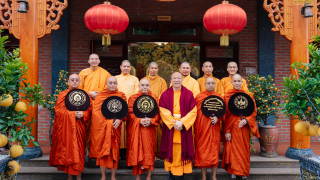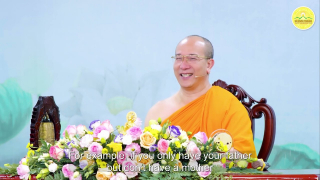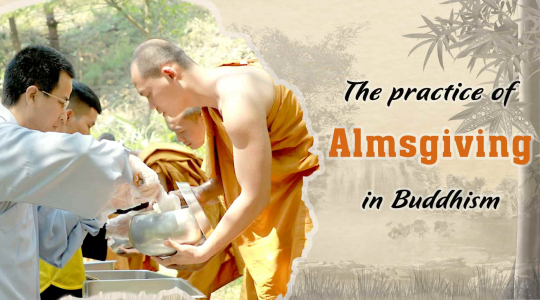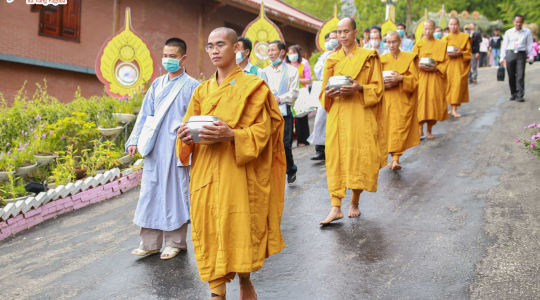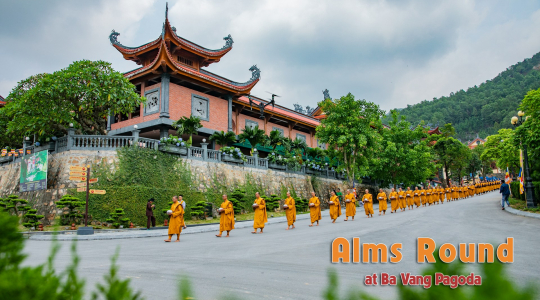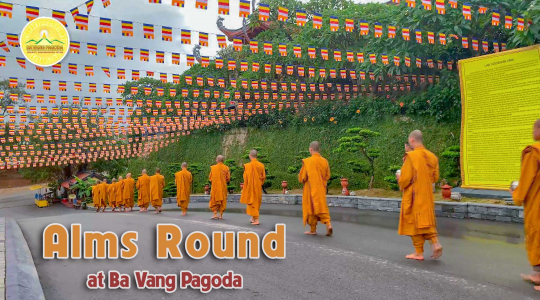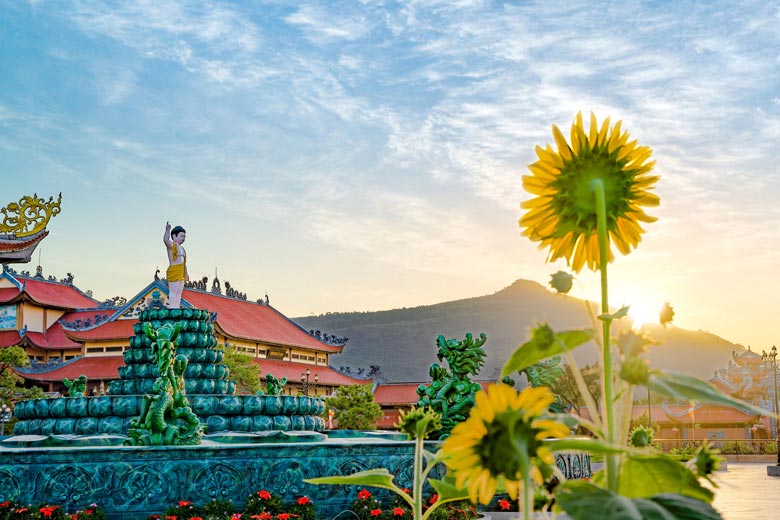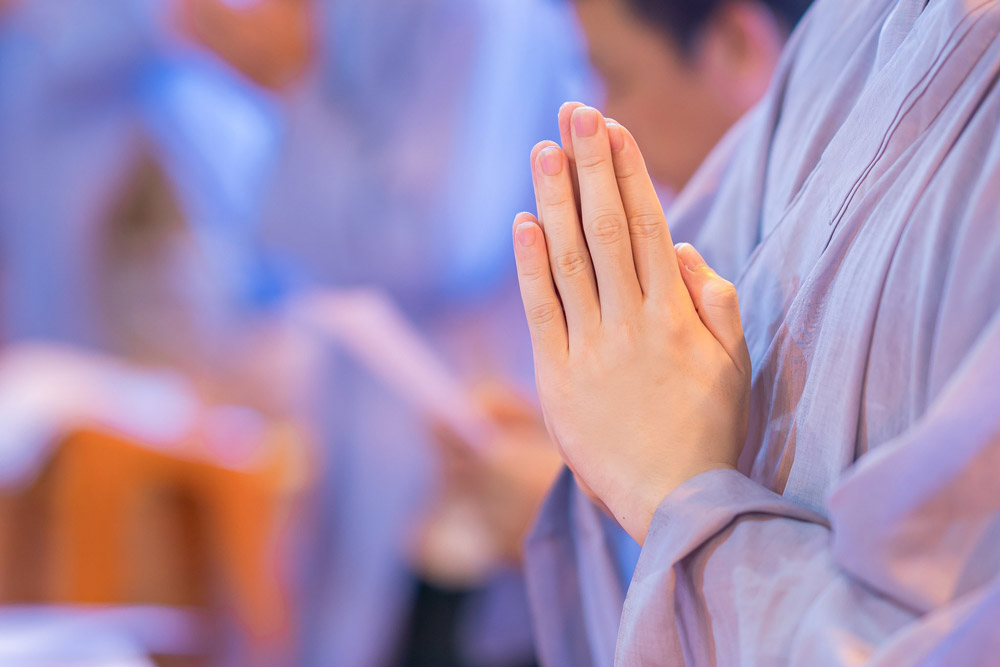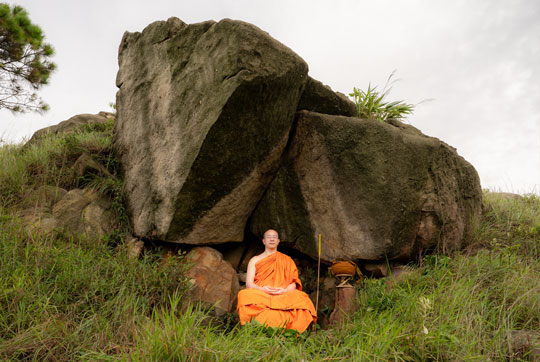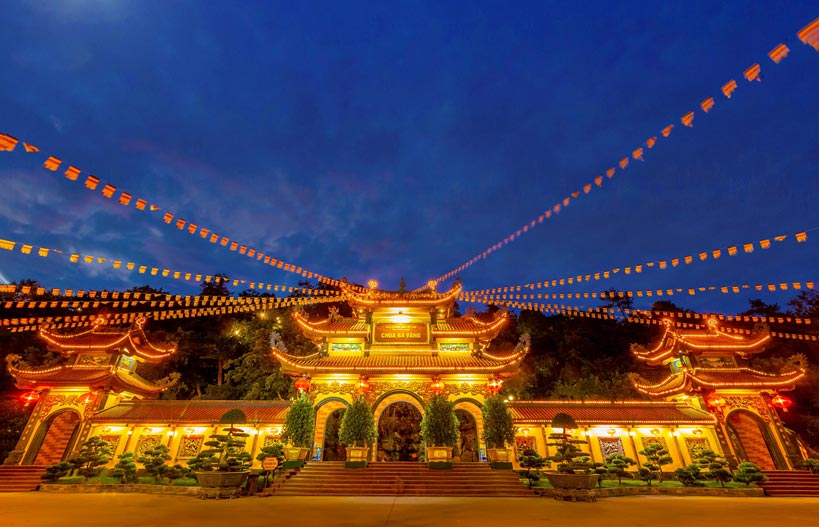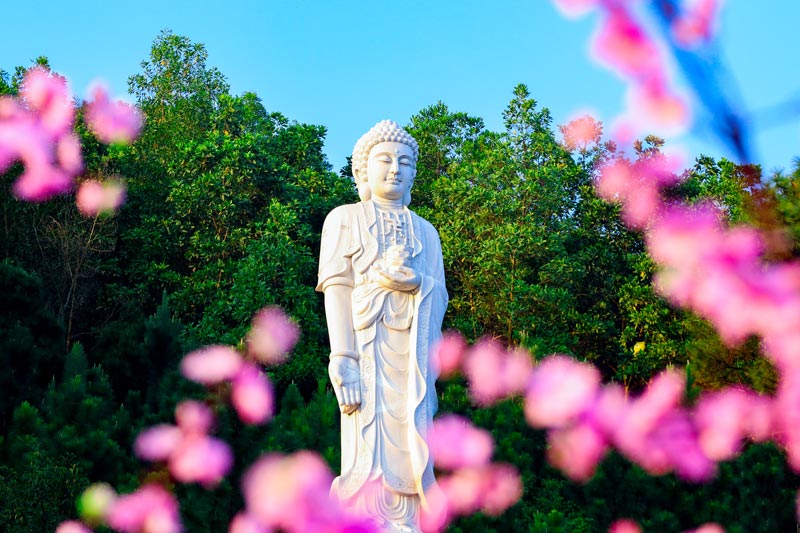The almsgiving programme to repay the debt of gratitude to the country
Following Thay Thich Truc Thai Minh's instructions to repay the debt of gratitude to the nation, Buddhists of Ba Vang Pagoda vowed to adopt a cultivation programme and requested permission to give alms to Monks and Nuns. The merit from those Buddhist activities was dedicated to the country's peace, its citizens' well-being and the perpetual presence of virtuous and talented leaders who can lead the country to power and prosperity. Approved by Thay Thich Truc Thai Minh, members of Chrysanthemum Club of practising six points of reverent harmony adopted the one-week programme to follow seven practices of making the country prosperous that the Buddha taught, namely the seven practices of no-regression, from 01 to 07 June 2020, with the aim of dedicating the merit to the country's peace.
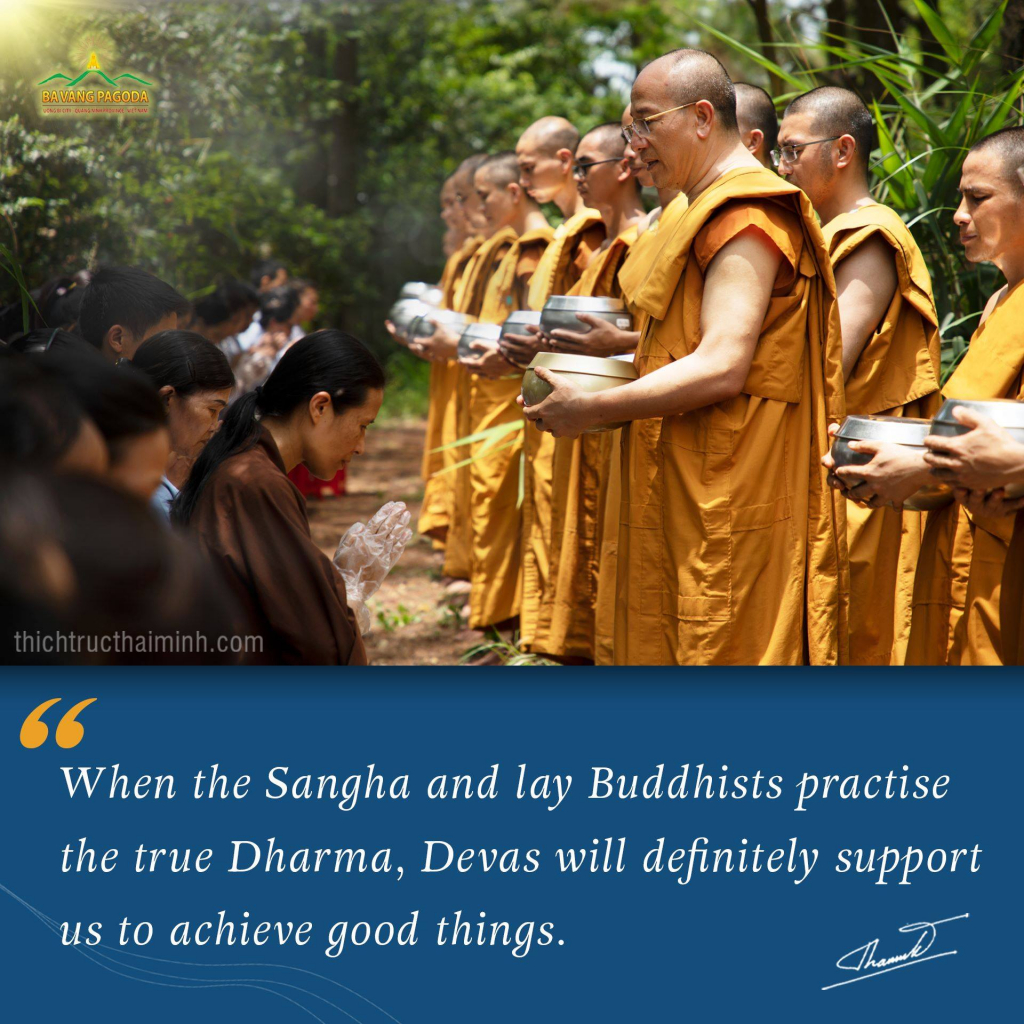 Following Thay Thich Truc Thai Minhs instructions to repay the debt of gratitude to the nation, Buddhists of Ba Vang Pagoda vow to adopt a cultivation programme and request permission to give alms to Monks and Nuns. Thay Thich Truc Thai Minh and His Sangha accept and witness offerings of Buddhists, praying for the countrys peace.
Following Thay Thich Truc Thai Minhs instructions to repay the debt of gratitude to the nation, Buddhists of Ba Vang Pagoda vow to adopt a cultivation programme and request permission to give alms to Monks and Nuns. Thay Thich Truc Thai Minh and His Sangha accept and witness offerings of Buddhists, praying for the countrys peace.The wish for the country's peace belongs to the mind of compassion, which means the wish for the happiness of sentient beings. Besides, Buddhists of Ba Vang Pagoda wish for the country's peace so that they always have favourable conditions to practise the Dharma.
Benefits from cultivating the compassionate mind to repay the debt of gratitude to the nation
The mind of compassion, love, forgiveness, kindness will result in those blessings above in the current life and later lives in accordance with the law of cause and effect. Cultivating the compassionate mind to repay the debt of gratitude to the nation and pray for the country's peace will bring practitioners great benefits as follows. In the current life:
- Eliminating bad karma relating to rivalry
- Improving relationships
- Encountering people with a willingness to support us in our good wishes
In later lives:
- Born into peaceful places
- Living a peaceful life
- Encountering the Buddha Dharma
- Easily advancing in wisdom and morals and making progress on the Path of virtue.
Adopting seven practices of no regression that the Buddha taught
So as to make our cultivation generate merit, we should practise the Dharma, that is, joyfully practising the mind of compassion with the enlightenment about the law of cause and effect. In the Buddhist spirit, in accordance with the principle of conditionality, if this exists, that exists; if this ceases to exist, that also ceases to exist. According to the seven practices of no regression that the Buddha taught, there are seven causes that will give rise to the appearance of the following conditions: the country will be led by wise leaders; many virtuous and talented people will appear; superior people will direct their mind towards the sake of the nation. That means there appear powerful rulers, strong officials and talented assistants, and the people joyfully advocate good practices with one accord. As Buddhists, we should sow the seeds of actualising these following seven causes.
“Vajjians often assemble to discuss righteous practices, cultivate blessings and correct themselves.”
To practise this teaching of the Buddha, we should practise six points of reverent harmony together, assist each other in doing good deeds in all aspects of life, transforming life for the better. That is, we should unite and live in harmony with each other.
“The king, officials and people of Vajji stand united with each other. Officials and citizens are loyal to their king. The king honors counsel and never acts brutally.”
Every Buddhist, depending on their own conditions, should encourage each other to fulfil their social duties in accordance with the Righteous Dharma.
“Vajjians preserve righteous practices and advise each other not to take what is not given and obey the national law. No one dares to commit crimes.”
The Buddha taught lay Buddhists to fully observe five precepts to live a moral and happy life, namely refraining from destroying beings, stealing, sexual misconduct, false speech and intoxicating substance. The above practice of the Vajjian belongs to the precept of refraining from taking what is not given. Buddhists should strictly observe the precept of abstaining from stealing, advise everyone and educate descendants not to steal.
“Vajjians treat each other with respect. Males and females, adults and children know their positions, complying with behavioral norms.”
Buddhists should strictly observe the precept of abstaining from sexual misconduct. Also, they advise others and educate their descendants not to commit adultery.
“Vajjians are dutiful to parents, adore their chief teacher and listen to commandments, considering them the national rules.”
Buddhists should practise the virtue of filial piety, advise others and educate their descendants to nurture filial affection. Besides, Buddhists should respect their Dharma teacher and follow His instructions to practise the Buddha's teachings to give up bad deeds, observe precepts, diligently learn and practise the Dharma.
“Vajjians know to follow the weather and use land. They value crops and diligently plow throughout the year.”
Buddhists should work hard and take care of their family to fulfil their duties like what the Buddha taught in Sigalovada Sutra. “He who acquires his wealth in harmless ways like a bee that honey gathers, riches mount up for him like ant hill's rapid growth. With wealth acquired this way, a layman fit for household life, in portions four divides his wealth: thus will he win friendship. One portion for his wants he uses, two portions on his business spends, the fourth for times of need he keeps.” (Translated from the Pali by Narada Thera, 1996)
“Vajjians revere virtues. Sramanas, sage men and Arhats from afar reaching Vajji are provided with necessities like clothing, bedding and medicine.”
Buddhists should make offerings of the four necessities of life to Monks and Nuns to support the Three Jewels. Thay Thich Truc Thai Minh once taught: “Alms bowls of monks are blessing bowls of all sentient beings. The ones who give alms to monks will get a lot of blessings. Even if we give just a bit of rice, we will never suffer from hunger or be born in a poor family in many future lives.” If we reverently give alms to Monks, we are increasing the blessings of ourselves, our family as well as our country. Under the guidance of Thay, Ba Vang Pagoda's Buddhist community has been practising those seven practices. To fulfil the wish to repay the debt of gratitude to the country, Buddhists carried out the seventh practice by giving alms to Monks and Nuns from June 03 to 06 2020.
When carrying out the cultivation, reciting the sutra, making offerings and giving alms, what minds should we have?
The mind of gratitude
We should think about sovereigns, leaders, officials, generals and people who died for the cause of national defence and construction to develop the mind of gratitude to them.
The mind of boredom and fear towards the defeat and collapse of the country
When a war occurs, suffering follows. Death, famine, separation of families, etc. are consequences of wars. Try thinking of those things and we will realise great misery caused by wars, hence our mind of boredom and fear towards the defeat and collapse of the country.
The mind of compassion
We should be enlightened about the causal conditions of seven practices of no regression that make the country prosperous.
The mind of embarrassment
It is an embarrassment towards our predecessors if we do not have a mind to repay the debt of gratitude or take actions to repay the debt of gratitude. If we don't repay the debt of gratitude, we should feel embarrassed towards the Buddha for not following His teachings or cultivating our mind.
The mind of earnestness
Following the mind of gratitude, of boredom and fear of war, of enlightenment and compassion and of embarrassment, we will develop the earnest mind to adopt the seven practices to fulfil our wish that the country will be peaceful and the Dharma will flourish. All good deeds stemming from enlightenment and compassion will bring practitioners great blessings and benefits in their current life and future lives. In the Sutra of seven practices of no regression, the Buddha taught: “supposing Vajjians only adopt one of those practices, you can't win them, let alone the fact that they practise all seven.” Understanding the Buddha's teachings, with the enlightenment, Buddhists joyfully preserved the practice of offering the four necessities of life to the Sangha, so that the country is peaceful and they can have favourable conditions to practise the Righteous Dharma. May the country be peaceful. May the Buddha Dharma flourish. Namo Shakyamuni Buddha!
Reciting the Sutra of seven practices of no regression for seven days
Let's recite the Sutra of seven practices of no regression for seven days to pray for the peace of your country as the following instruction. “Dear Shakyamuni Buddha, the Enlightened One who taught us about the law of cause and effect! I would like to cultivate the mind of compassion, wishing my country will always be at peace, without wars, the economy will thrive and people will enjoy well-being. Now I will read Your teachings so that I can be enlightened and then, practise what you taught about the seven practices that make the country prosperous. I vow to dedicate the merit from reciting the Sutra to my country's peace.
The Buddha taught seven practices that make a country prosperous
Thus I have heard. Once the Buddha was staying in Rajagaha on the mountain called Vultures' Peak with one thousand and two hundred fifty Bhikshus. At that time, King Ajatasatru of Magadha was ruling five hundred small states. Because Vajji, the neighbouring country, didn't submit itself to the king, he wanted to send his troops to invade it. So the king asked his mandarins to assemble for consultation. "Vaji prospers and produces a lot of jewels but doesn't submit itself to me. In your opinion, should we bring troops to Vajji?", said the king. His chief minister, Vassakara replied: "Your Highness, you should fight." Then the king told him: "The Buddha is not staying far from us. He is the Sage who has attained three insights. He knows everything. Come to the Buddha and ask Him whether I can win if I bring troops to Vajji.” Obeying the order, Vassakara prepared his chariot and travelled to the Buddha's monastery. When reaching the monastery, He came to salute the Buddha. The Buddha told the chief minister to sit aside then asked him, "Where did you come from?" The chief minister said, "King Ajatasatru told me to inquire after You as always." The Buddha continued, "Are the king and the people well?" "The king and the people are well thanks to Your merit.", said the general. On that occasion, he told the Buddha, "There's hostility between the king and Vajji. He intends to bring troops to Vajji and conquer it. Could you please tell whether the king can win or not?" The Buddha replied, "Chief minister, Vajjians adopt seven practices so you cannot conquer them. May the king consider carefully so as not to hurriedly deploy troops." "What are those seven practices?", asked the chief minister. The Buddha said, "What are seven? First, Vajjians often assemble to discuss righteous practices, cultivate blessings and correct themselves. Second, the king, officials and people of Vajji stand united with each other. Officials and citizens are loyal to their king. The king honors counsel and never acts brutally. Third, Vajjians preserve righteous practices and advise each other not to take what is not given and obey the national law. No one dares to commit crimes. Fourth, Vajjians treat each other with respect. Males and females, adults and children know their positions, complying with behavioral norms. Fifth, Vajjians are dutiful to parents, adore their chief teacher and listen to commandments, considering them the national rules. Sixth, Vajjians know to follow the weather and use land. They value crops and diligently plow throughout the year. Seventh, Vajjians revere virtues. Sramanas, sage men and Arhats from afar reaching Vajji are provided with necessities like clothing, bedding and medicine. A king who can adopt those seven practices will not be endangered. Even if you bring the whole world to fight him, you can't win. Chief minister, supposing Vajjians only adopt one of those practices, you can't win them, let alone the fact that they practise all seven. Now the Buddha speaks a verse, "Conquering someone is not pride. There still exists suffering. One craves to conquer himself. That leads to birthless." Hearing the verse, Vassakara immediately saw the Dharma. At that time, everyone in the Great Assembly became Srotapanna, that is, attaining the fruit of stream entry. The chief minister stood up, saluting the Buddha and left. He came back and told the king everything. King Ajatasatru then gave up his intention to fight against Vajji. He strictly followed the Buddha's teachings and took them as guidelines to educate the people. Afterwards, Vajji submits itself to Magadha. Two countries become one that thrives.
The three refuges
To the Buddha, I return and rely, vowing that all living beings understand the great way profoundly, and bring forth the bodhi mind.
To the Dharma, I return and rely, vowing that all living beings deeply enter the sutra treasury, and have wisdom like the sea.
To the Sangha, I return and rely, vowing that all living beings form together a great assembly, one and all in harmony without obstructions.
Dear Shakyamuni Buddha, I wish that I will gain the blessings of… (say what you are hoping for, such as good health, good job, etc.). I wish that my country will always be prosperous and peaceful.


